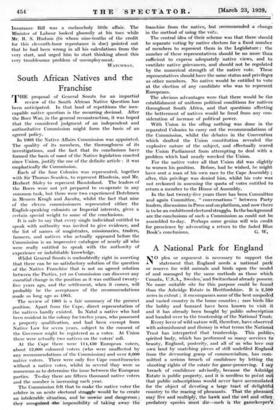South African Natives and the Franchise
THE proposal of General Smuts for an impartial review of the South African Native Question has been anticipated. In that land of repetitions the ines- capable native question is the recurring decimal. After the Boer War, in the general reconstruction, it was hoped that the considered judgment of an independent and authoritative Commission might form the basis of an agreed policy.
In 1903 the Native Affairs Commission was appointed. The quality of its members, the thoroughness of its investigations, and the fact that its conclusions have formed the basis of most of the Native legislation enacted since Union, justify the use of the definite article : it was emphatically the Commission. • • Each of the four Colonies was represented, together with Sir Thomas Scanlen, to represent Rhodesia, and Mr. Herbert Sloley to represent Basutoland. The leaders of the Boers were not yet .prepared to co-operate in any common task, but there were two experienced Dutchmen in MesserS Krogh and Jacobz, whilst the fact that nine of the eleven commissioners represented either the English-speaking colonists or Imperial interests, gives a certain special weight to some of the conclusions.
It is safe to say that every single individual entitled to speak with authority was invited to give evidence, and the list of names of magistrates, missionaries, traders, farmers, and natives who actually appeared. before the CommisSion is 'an impressive catalogue of nearly all who were really entitled to speak with the authority of experience or indubitable knowledge.
'Whilst General Smuts is undoubtedly right in asserting that there can be no satisfactory solution of the question of the Native Franchise that is not an agreed solution between the Parties, yet no Commission can discover any essential change in the position as it was outlined twenty- five years ago, and the 'settlement, when it comes, will probably be the acceptance of the recommendations made as long ago as 4905.
The review of 1905 is a fair summary of the present position. Apart from the Cape, direct representation of the natives hardly existed. In Natal a native who had been resident in the colony for twelve years, who possessed a property qualification, and had been exempt from Native Law for seven years, subject to the •consent of the Governor might be registered as a voter. At Union there were actually two natives on the voters' roll.
At the Cape there were 114,450' European voters, about 12,000 coloured voters (who were unaffected by any recommendations of the Commission) and over 8,000 native voters. There were only five Cape constituencies without a native voter, whilst in several they were so numerous as to determine the issue between the European parties. To-day there are fifteen thousand native voters and the number is increasing each year.
The Commission felt that to make the native voter the arbiter in an acute electoral struggle would be to create an intolerable situation, and be unwise and dangerous ; they recognized Site impossibility of taking away the franchise from the native, but recommended a change in the method of using the The central idea of their scheme was that there should be separate voting by native electors for a fixed number of members to repreient them in the Legislature ; the number of these repreSentatives should be no more than sufficient to express adequately native views, and to ventilate native grievances, and should not be regulated by the numerical strength of the native vote. These representatives should have the same status and privileges as other members. No native would be entitled to vote at the election of any candidate who was to represent Europeans.
The obvious advantages were that there would be the establishment of uniform political conditions for natives throughout South Africa, and that questions affecting the betterment of natives would be freed from any con- sideration of increase of political power.
With Union in the offing nothing was done in the separated Colonies to carry out the recommendations of the Commission, whilst the debates in the Convention which drafted the Union constitution revealed the explosive nature of the subject, 'and effectually scared the Union Parliament from attempting to deal with a problem which had nearly wrecked the Union.
For the native 'voter all that Union did was slightly to worsen his position. Before, had he wished, he might have sent a man of his own race to the Cape Assembly ; after, this privilege was denied hith, whilst his vote was not reckoned in assessing the quota of votes entitled to return a member to the House of Assembly.
In the last twenty-five years there has been Committee and again Committee, " conversations " between Party leaders, discussions in Press and on platform, and now there is to be an embittered electoral struggle. In the background are the conclusions of such a Commission as could not be assembled to-day. Perhaps some genius will win credit for prescience by advocating a return to the faded Blue
















































 Previous page
Previous page